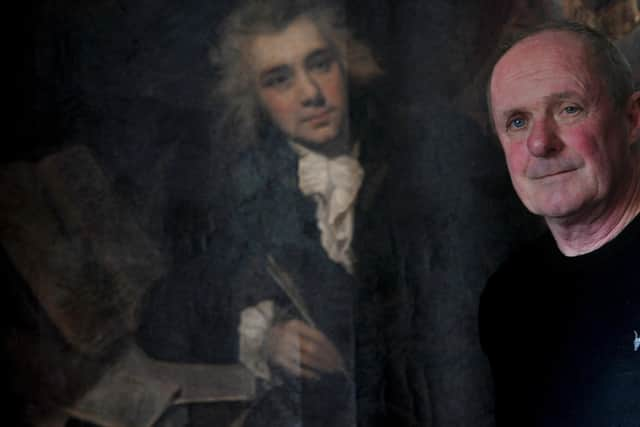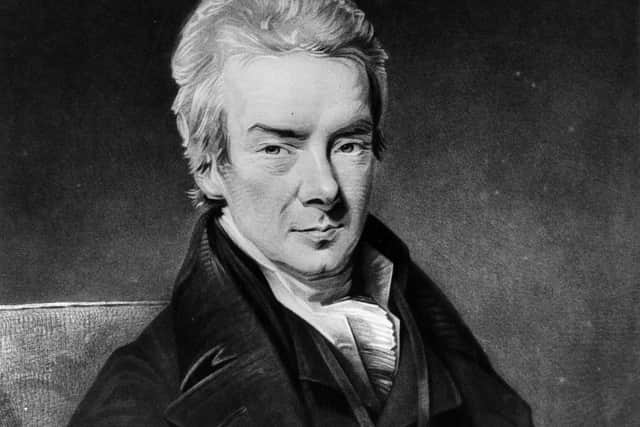Why the Harrogate descendants of anti-slavery campaigner William Wilberforce are still pushing the Black Lives Matter message today
and live on Freeview channel 276
Across the nation, councils are currently reviewing statues under the jurisdiction which hold a connection to slavery.
Advertisement
Hide AdAdvertisement
Hide AdHowever, the same spotlight has also highlighted the tireless campaign by Yorkshireman William Wilberforce to abolish one of the greatest abominations in history.


More than two centuries have passed since the night in 1807 when the House of Commons finally passed the abolition of the slave trade, declaring that it could no longer accept “that British subjects are allowed to tear by violence from their home their fellow creatures, to convert them from free men into slaves, and to subject them for the remainder of their lives to the arbitrary will and wanton caprice of others”.
Yet according to the politician’s great, great, great, great, grandson - also called William Wilberforce - who owns Markington Hall, between Harrogate and Ripon, we still have much to learn from the long campaigns that led to such a moment if we are to defeat injustice today.
It is a lesser-known fact that the great emancipator has a link to the Harrogate district.
Advertisement
Hide AdAdvertisement
Hide AdMr Wilberforce, who has lived at the Tudor home for the last decade, said: “I feel the abolition of the slave trade was just the beginnning of getting things right.


“I think it’s really interesting that things have kicked off here. I can’t say I blame people. There is still a lot of racism in this country against all people of colour.”
Mr Wilberforce said he agreed with the string of campaigns to take down the statue of Edward Colston in Bristol.
He said: “It’s a real affront to have that up there. It is venerating someone doing a lot of bad things. I can’t understand why it hasn’t been put in a museum.
Advertisement
Hide AdAdvertisement
Hide Ad“I feel there is a lot of work to be done with race relations. It’s all about education.”
The son of a wealthy Hull merchant, William Wilberforce was born on 24 August 1759. He studied at Cambridge University where he was a very good friend of future Prime Minister William Pitt the Younger.
Wilberforce had been persuaded to lobby for the abolition of the slave trade by Thomas Clarkson and for 18 years he regularly introduced anti-slavery motions in parliament.
Advertisement
Hide AdAdvertisement
Hide AdIn 1807, the slave trade was finally abolished, but this did not free those who were already slaves. It was not until 1833 that an act was passed giving freedom to all slaves in the British empire.
At one time, Wilberforce had a vast property portfolio in both London and Yorkshire. But he was forced to sell almost all of it - including a house and dock in Hull, as well as a large house in Wimbledon, South-West London - to bail out his own son from enormous debts run up in a failed business venture.
Markington Hall was one of the few properties the Wilberforces managed to hold on to, although he never actually lived there because it was tenanted.
Mr Wilberforce said: “He would have come here at some stage to see how things were going, but sadly I have no historical evidence or details of this.”
Advertisement
Hide AdAdvertisement
Hide AdThe Tudor home, which was first mentioned in the Doomsday Book as a fortified hunting lodge in the Forest of Knaresborough, had come into the family through the marriage of William’s grandfather in 1731 and, at its greatest extent, was the centre of a 2,000-acre estate.
Although most of the land was sold in the 20th century, the hall has remained in the family ever since, passing through the hands of a number of William Wilberforces - for at least seven generations a son has borne the same forename.
The only exception was during the thirties when it was home to Lord and Lady Illingworth - he had married into the Wilberforce family.
Markington Hall would be an impressive size even without any extension. In Tudor times it was a simple rectangle. Two wings were added in the 18th century to form an ‘H’ shape. In the 20th century, two extensions were added at the rear of the house - though one of them has since been removed.
Advertisement
Hide AdAdvertisement
Hide AdThe house is now a popular wedding venue and also boasts a campsite.
Markington Hall’s famous owner eventually retired from politics in 1825 and died on July 29, 1833, shortly after the act to free slaves in the British empire passed through the House of Commons. He was buried in Westminster Abbey.
Mr Wilberforce said: “He was very much against racism and the slave trade. It’s wonderful to have that heritage.
“My son is currently doing a degree at the London School of Economics in Human Rights. So he is continuing in some ways along the same lines.”
Former slave buried in town:
Advertisement
Hide AdAdvertisement
Hide AdAn American former slave who made a major impact in Britain lived out his final days in Harrogate and is buried in the town.
Thomas Rutling was born on December 24, 1854 into slavery in Tennessee, America.
The last of nine children, his father had either been sold by slavers or had run away before his birth and his mother was then sold when he was just three-years-old.
Having started work on his master’s plantation at the age of eight, he was also a dining room waiter during his time as a slave before the civil war eventually caught up with the ‘south’ and he was freed.
Advertisement
Hide AdAdvertisement
Hide AdAn original member of the Fisk Jubilee Singers, a choral group that toured throughout the United States and Europe, it was said that he was once ‘the best tenor in Tennessee’.
Well known for his singing, his eloquence, and his role as a representative of the Afro-American arts, he toured constantly with the Fisk choir until ill-health took its toll and he finally settled in Europe, spending time in Germany, Italy and Switzerland before arriving in England where he became a voice teacher.
Rutling performed in churches across the north before illness struck again and he moved to a nursing home in Harrogate, living out his final days at 97 Valley Drive. He died on April 26, 1915 and is buried at Grove Road cemetery.
A message from the Editor:
Thank you for reading this story on our website. While I have your attention, I also have an important request to make of you.
Advertisement
Hide AdAdvertisement
Hide AdIn order for us to continue to provide high quality and trusted local news on this free-to-read site, I am asking you to also please purchase a copy of our newspaper.
Our journalists are highly trained and our content is independently regulated by IPSO to some of the most rigorous standards in the world. But being your eyes and ears comes at a price. So we need your support more than ever to buy our newspapers during this crisis.
With the coronavirus lockdown having a major impact on many of our local valued advertisers - and consequently the advertising that we receive - we are more reliant than ever on you helping us to provide you with news and information by buying a copy of our newspaper.
Thank you.